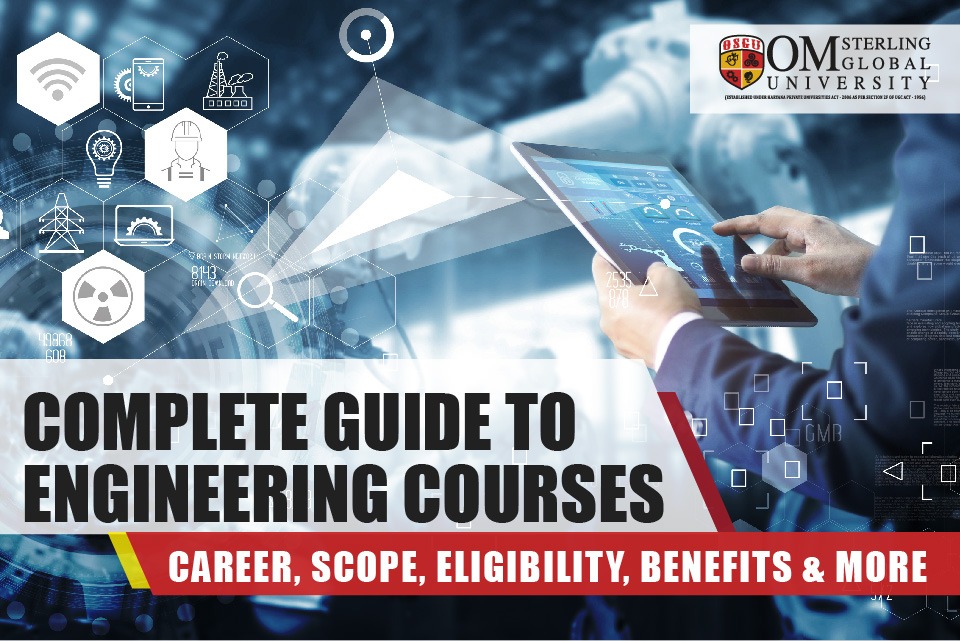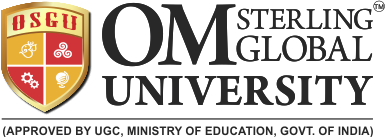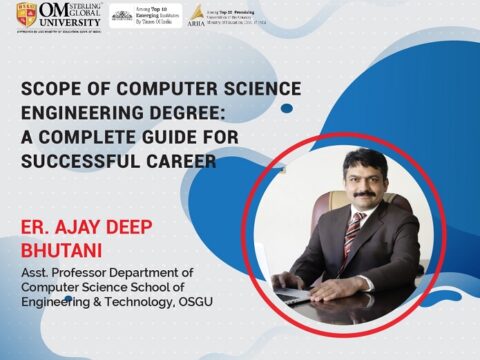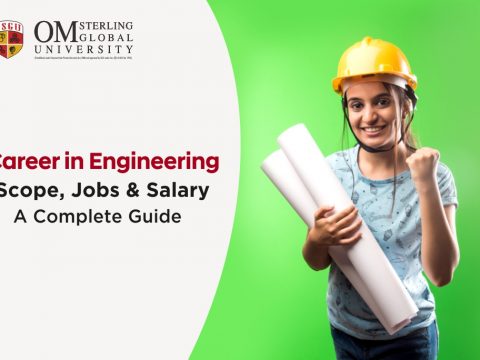-
Announcement : Admission Open Apply Now
 Pratibha Samman Samaroh– 2024
Pratibha Samman Samaroh– 2024 
Complete Guide To Engineering Courses: Types, Career, Scope, Eligibility, Benefits & More

Career Counseling Oriented Webinar
May 16, 2020
Covid-19 Impact On Education Sector In India
May 23, 2020
Complete Guide To Engineering Courses
An Overview of Engineering
Engineering in its simplest words means – building and designing things that have the capability of solving real-world problems. For example, if an astronaut wants to go to space, he’ll either need a spaceship or a rocket,and building these is the job of an aerospace engineer. So, engineering means exploring our scientific understanding of this world and utilize its resources to meet certain practical and achievable goals. Engineers use the basic and advanced concepts of mathematics and science to solve problems. During their course of study, engineers have to know how things work intricately and they are the ones who are responsible to assist the inventors and scientists to make their innovations come true and available to the community.
Now you might be thinking whether or not engineering is important? And the answer is yes, of course, engineering is very important and the world needs more engineers than ever to meet the needs of the growing population. Like – with the ever-growing populace, we need more vehicles for transportation and this is the role of an automobile engineer to design and build great quality vehicles for society.
Also, engineering provides you a great opportunity to work amongst the greatest minds of our generation. Let’s say if you’re great at coding or you’re simply amazing at hardware; you can get a chance to work at Microsoft, with Bill Gates, itself. If you have revolutionary ideas and are passionate to make a positive change on this planet, you can shake hands with Elon Musk, So, yes, the realm of engineering is beyond any other and this renders a platform for everyone to make their dreams come true. Engineering in modern time is relevant and it will stay relevant in the next 1000 years to come and more.
Before delving deeper, we are going to cover everything there is to know about engineering in this blog, such as – course, the scope of engineering, career after engineering, benefits of engineering, trends, eligibility, and concerned exam for engineering, etc. So, let the journey begin…
About Engineering Courses – Overview
An engineering course is a way of getting an engineering degree at various levels such as bachelors and masters. All these courses are very crucial in their level. For example, studying in a top-rated engineering college or university for gaining a B.E. or B. Tech degree is like a dream come true for them.
For a scholar engineering student, studying and learning amongst the great minds for having an M. Tech or M. Phil degree is an achievement. So, the value of these engineering courses in your life depends upon in which phase of the student journey you are! You must prepare well for competitive examinations like GATE and JEE Mains and score marks with flying colors. In India, these are the 5 major engineering courses offered to the students:
- Diploma in Engineering Course
- UG Engineering Courses – BE, B. Tech
- Tech Lateral Entry
- PG Engineering Course – ME/M. Tech
- Doctoral Engineering Courses – M. Phil/Ph. D
We will also look into the criteria for getting admission in colleges or universities in the coming part of the blog.
Types of Engineering Courses Offered at Various Levels
Engineering courses are mainly offered in 5 ways to the aspiring students and they are – Diploma Engineering Course, UG Engineering Courses – BE, B. Tech, B. Tech Lateral Entry, PG Engineering Courses, like – ME/M. Tech, and Doctoral Engineering Courses – M.Phil/Ph. D.
Now, let us see in detail what diploma in engineering is? What is B.E? What is M. Tech and what is Ph.D. or M.Phil.In engineering?
Here are the different degree levels of engineering courses:
1. Diploma in Engineering:
A diploma in technical education or engineering is a specialized program that concerns the practical and skill-based training programs. The motive for studying a diploma course is generally to gain a job or industry-oriented engineering knowledge, scientific prowess analysis, and computing or mathematical knowledge to communicate with peers and apply the skills to solve engineering problems.
2. B.E. or B. Tech:
Bachelor of Technology (B.Tech) is a coveted andprofessional engineering degree program awarded to undergraduate candidates after completion of 4 years of rigorous study and gaining practical knowledge in the respective field. A degree in B. Tech or B.E. is the inception of a great career in the world of engineering.
3. B. Tech Lateral Entry:
In simple words, B. Tech Lateral Entry means studying B. E. or B. Tech from the 2nd year itself.Sometimes, this lateral entry test acts beneficial to the students as they will have better knowledge and experience as compared to a regular 2nd-year student.
4. M. Tech or M.E.:
In India, an M.E. or M. Tech is a highly popular degree that falls under the postgraduate program in the engineering domain. It is a 2-year program and a student can apply for it after completing a 4-year undergraduate degree in engineering – B.E. or B. Tech.
5. M. Phil or Ph. D in Engineering:
The M. Phil or Ph. D is the highest attainable degree in engineering. This degree is offered by the Department of Engineering for doing a full-time one-year course for research purposes. The main aim of mostly all the students going for an M. Phil or Ph.D. in engineering is to gather special knowledge in a particular filed and enhance their research skills.
Engineering Top Disciplines/Branches
Truth be told, engineering is vast and there are several areas to start with. There is a branch that is known as the “evergreen branch” due to its popularity and never-ending scope in the real world. It is also a core branch. There are civil engineering, electrical engineering, electronics and telecommunication engineering, chemical engineering, automobile engineering, electrical and electronics engineering and the list goes on.
So, without any further ado, let us see the top engineering disciples or branches as they say:
- Electronics and Communication Engineering
- Electrical engineering
- Mechanical engineering
- Civil engineering
- Computer science engineering
- Automobile engineering
- Aerospace engineering
- Agricultural engineering
- Biomedical engineering
- Chemical engineering
- Environmental engineering
- Materials engineering
- Mining engineering
- Biochemical engineering
- Metallurgical engineering
Career & Jobs Opportunities After Engineering

Engineering has a lucrative career and you will be enthralled to know that around 6-7 engineering students pass-out every year. The competition is ever-increasing in this field but if you are good at basic concepts and have top-notch communication skills, no one can stop you from climbing the ladder of success.
If you have chosen mechanical engineering, then you can start working with an amazing mech-firm or if you’re a computer science engineer and want to develop some out-of-the-world mobile and desktop applications then you can enter the IT industry or can delve deeper into public sector jobs. As clichéd this can get, but the world is your oyster and you can do whatever you like.
Here is a list of few enticing job opportunities in the realm of engineering:
- Computer Science Engineer
- Mining Engineer
- Mechanical Engineer
- Ceramic Engineer
- Civil Engineer
- Production Engineer
- Automobile Engineer
- Robotics Engineer
- Chemical Engineer
- Electronics & Communication Engineer
- Electrical Engineer
- Electronics Engineer
- Software Developer
- Aeronautical Engineer
- Product Manager
- Marine Engineer
- Construction Engineer
- Aerospace Engineer
- Telecommunication Engineer and many more.
a) Career Options After Diploma Engineering Courses
Post-pursuing your diploma in any engineering stream, you can choose from a multitude of options to start your career. The job opportunities for diploma holders in engineering are rewarding and they are always welcome to work in any public or private sector. They can also choose to become a professor in a reputed college, university, or an institute.
b) Career Options After UG Engineering Courses
Engineers are highly revered in society for the contribution they make for the communities. They are welcomed with open hearts and arms in any industry. After completing B.E. or B. Tech from any stream you can choose to become – Computer Science Engineer, Mining Engineer, Mechanical Engineer, Ceramic Engineer, Civil Engineer, Production Engineer, Automobile Engineer, or Robotics Engineer. You can even walk on the roads of entrepreneurship if you have world-changing ideas. Via GATE you can even try to work in public sector jobs.
c) Career Options After PG Engineering Courses
Masters in engineering is one of the most sought after courses in India and every year, lacs of students are passing out to make their dreams come true in the modern world. They are highly skilled and have an in-depth knowledge of a subject so they can choose to become academicians, researchers, faculty members in a reputed college, or at times, they venture into entrepreneurship and managerial job roles.
d) Career Options after Doctorate in Engineering Courses
Once you have achieved a doctorate in engineering you can do whatever you want! You have reached the culmination point of engineering and if you have completed your Ph.D. or M. Phil in engineering from a reputed university, several organizations will start calling you for lucrative job offers. You can become a research scholar or a highly skilled faculty member in a top-notch engineering college.
Also Read: Career in Engineering: Scope, Jobs & Salary – A Complete Guide
Engineering Admission & Eligibility Criteria
A) Engineering Courses Admission Process
Prepare well for the engineering course you are going to apply to. Study with undivided focus and give your best. Here’s a general guideline for aspiring B.E., B. Tech Lateral Entry, and M. Tech students.
But please note, the eligibility criteria for the students for securing an admission in a college or university might change from college to college and place to place. The eligibility criteria mentioned below apply for most of the Indian colleges and universities.
- Admission process for Diploma in Engineering:Direct in Most of the Private colleges, for Government Colleges Entrance exam
- Admission process for UG in engineering:Admissions to B. Tech or B.E. programs take place through national level/state-level/institute-level engineering entrance examinations.
- Admission process for PG in engineering: For admission in IIT’s, NIT’s, and other government engineering colleges you must have a good score to get a confirmed seat in government colleges. For admission in Private Engineering colleges, you must apply for state-level entrance exams for Post Graduate Engineering program admissions.
- Admission process for Ph.D. in engineering: It is based on counseling post-clearing the entrance examinations like UGC-NET for different colleges.
B) Eligibility Criteria for Engineering Courses
- Eligibility Criteria for B.E. or B. Tech students: The aspiring candidates must have cleared 12th standard examination from a recognized board with Physics, Mathematics, and Chemistry as the core subjects. Also, they must have a minimum aggregate mark of 60% in the above subjects.
- Eligibility Criteria for B. Tech Lateral Entry: The aspiring students must have passed a three-year diploma granted by the Board of Technical Examination of a State Government with a minimum of 45% aggregate marks or equivalent.
- Eligibility Criteria for M.E. or M. Tech: The aspiring candidates must have a BE or B. Tech degree. They also need to have a valid score in GATE exam. Those candidates are only eligible to study ME/M. Tech.
- Eligibility Criteria for Engineering Diploma: The aspiring students must have passed their Secondary School Leaving Certificate (SSLC)/tenth standard or any equivalent examination. They also need to score at least 35% marks in Science and Mathematics combined.
- Eligibility Criteria M. Phil or Ph.D. in engineering:The aspirants must have secured a minimum of 55% marks or 5.5 CPI in B. Tech/M. Tech or any equivalent degree in apt branches.
Future Scope of Engineering Degree
The future scope of engineering is flourishing and paved with prosperity. With the increasing population, the demand for good engineers is always on the rise. As told, engineers are the ones who solve a real-world problem with their skills; they will never go out of fashion. The engineers are welcome in any industry and recruiters as well as HR professionals are always in a constant lookout for great engineers so that they can join in their respective organizations and take the name to limits.
You can build, design, or develop dams, infrastructures, bridges, software, hardware, rockets, automobiles, missiles, etc. With an engineering degree in hand, you can grab great job opportunities outside India as well. Numerous MNCs in India and abroad always welcome engineers as they are very good with problem-solving, time management, aptitude, and other industry-relevant skills.
Benefits of Engineering

Engineering has numerous benefits but we can’t list them all for obvious reasons.
So, here are a few advantages of doing engineering degree that will attract you more towards this domain.
1. Great Job Satisfaction
Engineers cherish great job satisfaction in their respective organizations. They get several perks and bonuses for doing a great job at the office.
2. Multiple Career Opportunities
An engineer can choose to become a particular engineer of their respective domains or they can venture into entrepreneurship or managerial roles. They can even become a reputed faculty member in any engineering college.
3. Intellectual Development
Engineers get to work with the smartest minds in the world and there is no stopping to their intellectual growth. They bring solutions to real-life problems and set an example for others by becoming a beacon of light.
4. Challenging/No-Boring Work
The job profile of an engineer is not boring! They always face interesting challenges to solve and help others with their problem-solving skills. They enjoy working at their respective workplace as they have to face modern world challenges and requirements.
5. Helping Hand Of Society
Engineers act as a helping hand for society. They solve problems which in turn, makes our lives easier. They are responsible for building dams, airports, healthcare apparatus, pioneering developments in engineering, and many more.
6. Financial Security
Engineering is a highly lucrative career and they receive the highest starting pay or salary in any discipline.
7. Reputation:
Engineers are highly revered in society for their endless contributions. They are welcome everywhere and have a great future ahead as they will not be forgotten by society.
8. Scientific And Technological Discoveries:
Engineers always stay close to the people who led us to technological and scientific discoveries. Engineering helps you how things work and with this, you can achieve breakthroughs in any field including – healthcare, space and ocean exploration, robotics, automobile, and many more.
Engineering Trending Courses in 2020-2021
Along with engineering, certain certification courses and training programs assist an engineer to stay relevant with the latest engineering trends. MS in Data Science, PG in Machine and Deep Learning, a certification in Cloud Technology & Information Security, or aircraft maintenance engineering are the few most trending courses n 2020-2021.
Let us see them in more detail.
1. MS in Data Science:
An MS in Data Science can help you land in your dream job. You can work with tech giants like Google, Amazon, Oracle, and Microsoft. The role of a data scientist is to manage and interpret raw data into information to solve complex industry problems more efficiently.
2. PG in Machine and Deep Learning:
In simple terms, Machine and Deep Learning is concerned with the development of programs that can access data and utilize it to learn heuristically. A PG degree in the machine and deep learning can help you solve the most intricate problems with ease and you can work for top-notch MNCs in your early career stage.
3. Cloud Technology & Information Security:
Cloud technology and information security are two of the most demanding skills at present in the world. Every organization, no matter how big or small that requires information security to keep its data safe and cloud computing helps in an easier way of maintaining infrastructure in the office. These skills will never go out of the window in the coming future.
4. Artificial Intelligence Engineering:
In the modern world, artificial intelligence engineering is one of the most sought after courses and with the ever-increasing popularity of AI more number of students are willing to enroll themselves for this discipline. In layman’s terms, an artificial intelligence engineer is a trained professional who is concerned with conventional machine learning techniques like natural language processing and neural networks to develop and render models that are essential to power AI–based systems and applications.
Engineering Campus Placement
The training and placement cell of a college or university is responsible for maintaining a harmonious relationship between a college and an organization. They are responsible for placing the students in their dream companies. They help a student with mock interviews, group discussions; resume writing, CV-building, and communication skills.
Campus placement saves you from the hassles of walk-in interviews. Due to cutthroat competition in the real world, it is becoming more difficult to find a job that will nurture your career and take it to the next level. Campus placement helps a student to find a suitable job without any friction. The role of engineering campus placement plays a pivotal part in making the dreams come alive for the students.
Engineering Entrance Exam
An engineering entrance examination helps you secure admission in an engineering college. Majorly, there are three types of entrance examinations for engineering and they are – national level, state level, and institute/college/university level. We will see them in detail now.
-
National Level:
A national level entrance examination helps you get admission in IITs and the other most reputed engineering colleges in India. A few national level entrance examinations are – JEE Mains, GATE, AIEEE, and JEE Advanced.
-
State-Level:
Apart from the national level engineering entrance exams, various states across the country also hold separate entrance exams for the admissions to undergraduate engineering programs offered by their state universities and the respectively affiliated institutes. A few of them are-AP EAMCET, WBJEE, Assam CEE, CGPET, HPCET, UPSEE, KEAM, and more.
-
Institution Level:
The institution-level entrance examinations are organized by various engineering colleges and universities in India. This helps you in direct admission to your favorite engineering college. From a list of many, a few institution-level engineering entrance examinations are –VITEEE, COMEDK, KIITJEE, MHTCET, and more.
How to Choose Engineering College?
Thanks to technology, finding a suitable college for oneself has become a piece of cake. Firstly, you can make a rough list of all the colleges that you seem fit and then start visiting their respective websites. There, you can check about the faculty members as well as their placement records.
Also, you can take help from your near and dear ones. Ask your friends and consider their point of view. If you know a senior student or an alumnus, then you can directly ask them about a particular college.
Don’t forget to check their online reviews! Online reviews are a great source for knowing the reputation of a college as these reviews are posted by the passed-out students. If a college has less than 3.5 stars (out of 5) don’t join that college. Last, but not least, if possible, visit a college if you want to know about them in detail. Talk with a few faculty members, HODs, and Dean/Principal as this would really help you a lot to find the top engineering college.
The following parameters will help you decide whether or not to choose a particular engineering college
1. Accreditations & Affiliations:
Check if the engineering college or university has recognized accreditations such as NAAC or NBA. Apart from it is also important that the college must be affiliated with AICTE.
2. Infrastructure And Amenities:
Hostel amenities and a state-of-the-art infrastructure must be one of your deciding parameters for choosing an engineering college. A good infrastructure guarantees a great campus life and hostel amenities help you stay well and without any worries far from your home.
3. Hi-Tech Laboratories:
A reputed engineering college must-have hi-tech laboratories that are equipped with modern instruments. This helps a student get a better practical approach to a subject.
4. Eclectic Libraries:
An engineering college must have a central library that houses all curriculum-related books as well as national and international journals that help a student in research activities and gathering amazing insights that go beyond the typical classroom experience.
5. Training Programs And Certification Courses:
To help a student stay relevant with the current industry trends, a college must focus on providing training programs and certification courses. With this, the skills of an engineer never go out of style.
6. Faculty Members:
A reputed engineering college must have highly skilled and experienced faculty members. All major engineering universities have made it mandatory that their faculty members must have a Master’s degree to ensure a high quality of education. Also, this boosts the confidence factor among students that their professors are highly experienced mentors.
Summary
So, now you know everything there is to know about engineering, such as – what is engineering, how to choose an engineering college, types of engineering courses, benefits of engineering, types of entrance examinations, top engineering branches, job and career opportunities after engineering, and so on.
Follow this guide to get admission to a good engineering college that has all the aforementioned amenities. Don’t forget to check online ratings and accreditations along with affiliations. Remember, this is the choice of a lifetime and maybe one of the most important decisions that you have to make in your entire life. So, take your time and keep all these points in mind. Happy learning!
Industry-Oriented Engineering Courses
Om Sterling Global University is one of the most reputed universities in India for engineering courses that houses a modern infrastructure, hi-tech laboratories, eclectic libraries, and highly experienced faculty members for the aspiring engineering students. OSGU is dedicated to produce world class engineers, academicians, and leaders that inspire everyone to climb the ladder of success in life. So, join hands with us to study engineering amongst the best minds of the nation.
An industry-oriented course is an out-of-the-box approach to education where the main focus in on learning from the perspective of an industry. The industry-oriented courses are also job-oriented as the industries are always on a high demand for professionals who are not good in just theory but in practical aspects as well.
In industry-oriented course, a student learns the application of physics, mathematics, and science with the context of product development, design, and operation. An industry-oriented course renders knowledge that goes beyond a typical classroom experience.
Via industry-oriented courses, Om Sterling Global University is trying to make a student gethands-on experience to numerous real-life challenges and requirements that they have to face in this highly competitive market.



